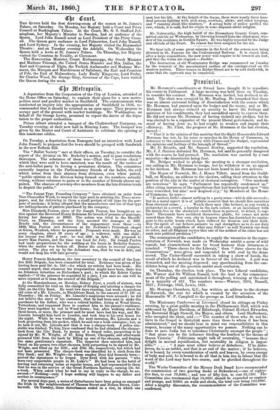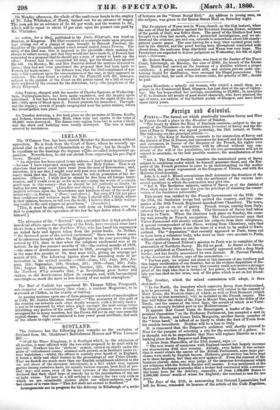Vruniurial.
Mr. Horsman's constituents at Stroud have thought fit to repudiate his course in Parliament. A large meeting was held there on Tuesday, to consider his conduct. Mr. Horsman was invited, but declined to at- tend. The chair was occupied by Mr. Marling. He remarked that there was an almost universal feeling of dissatisfaction with the course which Mr. Horsman had pursued upon the budget and the treaty, and as Mr. Horsman had always evinced an anxiety to know the feelings and opinions of his constituents, they had assembled openly to express them. He did not accuse Mr. Horsman of having violated any pledges, but he was elected to be a supporter of the present liberal government, and in- stead of having done so, he had sought to weaken and impair their efficiency. Mr. Flint, the proposer of Mr. Horsman at the last election, moved-
" That it is the opinion of this meeting that the Right Honourable Edward Horsman has not, by his votes or speeches in the House of Commons, in reference to the commercial treaty with France and the Budget, represented the opinions and feelings of the borough of Stroud."
Mr. D. Ricardo' and Mr. Samuel Bewley, supported the resolution. Mr. J. J. Stanton defended Mr. Horsman, but said he generally disagreed with the course he had pursued. The resolution was carried by a vast majority—the dissentients being four.
Mr. Bridges wished to pledge the meeting to a stronger resolution one calling on Mr. Horsman to resign, but he withdrew it on an appeal to his fairness. Mr. Horsman has not been heard in his own defence.
The Mayor of Norwich, Mr. J. Henry Tillett, issued from the Guild- hall, on Monday, an address to the electors, calling their attention to the position of the city in the matter of electoral corruption. "Our misdeeds are notorious" he says, "Parliament has repeatedly condemned us." After citing instances of the opprobrium that had been heaped upon "this once venerated, but alas ! now despised ci:y," by Members of the House of Commons, he says- " It matters little—almost nothing in a party sense—which side succeeds ; but in a moral aspect it is of infinite moment that we should free ourselves from electoral crime Watch these men [the bribers] as you would a pickpocket in a crowd, a burglar in the dark corner, or an incendiary with his match-box in the stackyard—watch them to prevent, to detect, to cap- ture! Thousands have sacrificed themselves gladly, for causes not more seared than this. Our own city in bygone times has furnished its contin- gent to the noble bends which have suffered for freedom and their faith. May the spirit of our fathers animate us and strengthen us to do our duty now, at all cost, regardless of what may follow ! so will Norwich rise from its ashes, and all England rejoice that one of the noblest of its cities has not sunk into political perdition !"
The nomination of the candidates, to supply the vacancies in the repre- sentation of Norwich, was made on Wednesday amidst a scene of wild tumult, but characterized more by broad humour than bitterness or mischief. "Three cheers for the Liberals," then "three cheers for the Conservatives" were given and responded to with zeal by the dense crowd. The Under-Sheriff succeeded in taking a show of hands, the result of which he declared was in favour of the Liberals. A poll was demanded, and the meeting dispersed : any speechmaking from the can- didates being out of the question amidst such confusion.
On Thursday, the election took place. The two Liberal candidates, Mr. Warner and Sir William Russell, took the lead at the commence- ment of the polling and maintained it throughout, winning at the close by a majority of 462. The numbers were—Warner, 2093, Russell, 2057; Forlonge, 1635, Lewis, 1631.
Mr. Montagu Chambers, Q.C., has written an address to the electors of Harwich, the seat for which is vacated by the accession of the Honourable W. F. Campbell to the peerage as Lord Stratheden.
The Missionary Conference at Liverpool dosed its sittings on Friday evening, by a great public meeting in the Philharmonic Hall, which was addressed by Major Davidson, of Edinburgh, Colonel Herbert Edwardes, the Reverend Hugh Stowell, the Mayor, and others. Lord Shaftesbury, who occupied the chair, said :—" The number of those who do not be. hew in the Gospel is thirtyfold more than those to whom it has been administered," and we should bear in mind our responsibilities in this respect, because of the many opportunities we possess. Nothing can be done to save India but to introduce Christianity amongst the people " ; "that alone can be the influence binding the heathen to the throne of Queen Victoria." Politicians might talk of neutrality, "because they delight in mutual mystification, but neutrality in religion is impos- sible." . . . "A man must either believe or disbelieve. If he disbe- lieves, he is an infidel, and that is an end of the matter ; if he believes,
he is bound, by every. consideration of earth and heaven, by every energyof bocly and soul, he 18 bound to do all that in him lies to labour that the word of the Lord may have free course, and be glorified throughout the world."
The Works Committee of the Mersey Dock Board have recommended the construction of two graving docks at Birkenhead,—one of eighty- five feet, to cost 70,8501.; and one of fifty feet, to cost 52,1201. The Committee also recommend that 10,0001. should be expended on engines and pumps, and 95001. on walls and sheds, the total cost being 142,000/. After a lengthy discussion, the recommendation of the Committee was confirmed.
On Monday afternoon, the whole of the card-room hands in the employ of Mr. John Whittaker, of Hurst, turned out for an advance of wages. The men ask for an advance of 28. 6d. per week, and the women ls. 6d., which will be equal to about 15 per cent, upon the present rate paid by Mr. Whittaker.
An action, for a libel, published in the Daily Telegraph, was tried on Monday, at Kingston. The libel consisted of comments made upon proceed- ings arising out of a charge of rape, brought by Hannah Percival, the daughter of the plaintiffs, against a man named named James Powers. The sting of the libel was, that it imputed to the plaintiffs—their making the charge to ettort money, and that they would not have made it, if Powers had consented to a proposal that he should pay a sum of money to hush up the affair. Powers had been committed for trial, but the Grand Jury ignored the bill. On Monday, Mr. and Mrs. Percival denied the motives imputed to them ; they had not even sanctioned the proposal that had been made to Powers for hush.money. The defence was, that the libel complained of was only a fair comment upon the circumstances of the case, as they appeared in evidence. The Jury found a verdict for the Plaintiffs with 50l. damages, subject to the opinion of the Court on the points raised by a bill of excep- tions tendered by the counsel for the defendant, Levy—the proprietor of the Daily Telegraph.
John Fenton, charged with the murder of Charles Spencer, at Walkering- hatu, Nottinghamshire, has been again examined, and the inquiry again adjourned. A hat has been found—which he wore on the night of the mur- der—with spots of blood upon it. Fenton protests his innocence. Through- out the the inuiry, crowds of people congregated near the police station, where the investigation took place.
On Tuesday morning, a fire took place on the premises of Messrs. Soulby and Dobson, wine-merchants, Hull, when wine and spirits to the value of 10,000/. were destroyed. The flames were raging from two to seven o'clock, and the stock and building were totally destroyed. The loss is nearly covered by insurances.



























 Previous page
Previous page